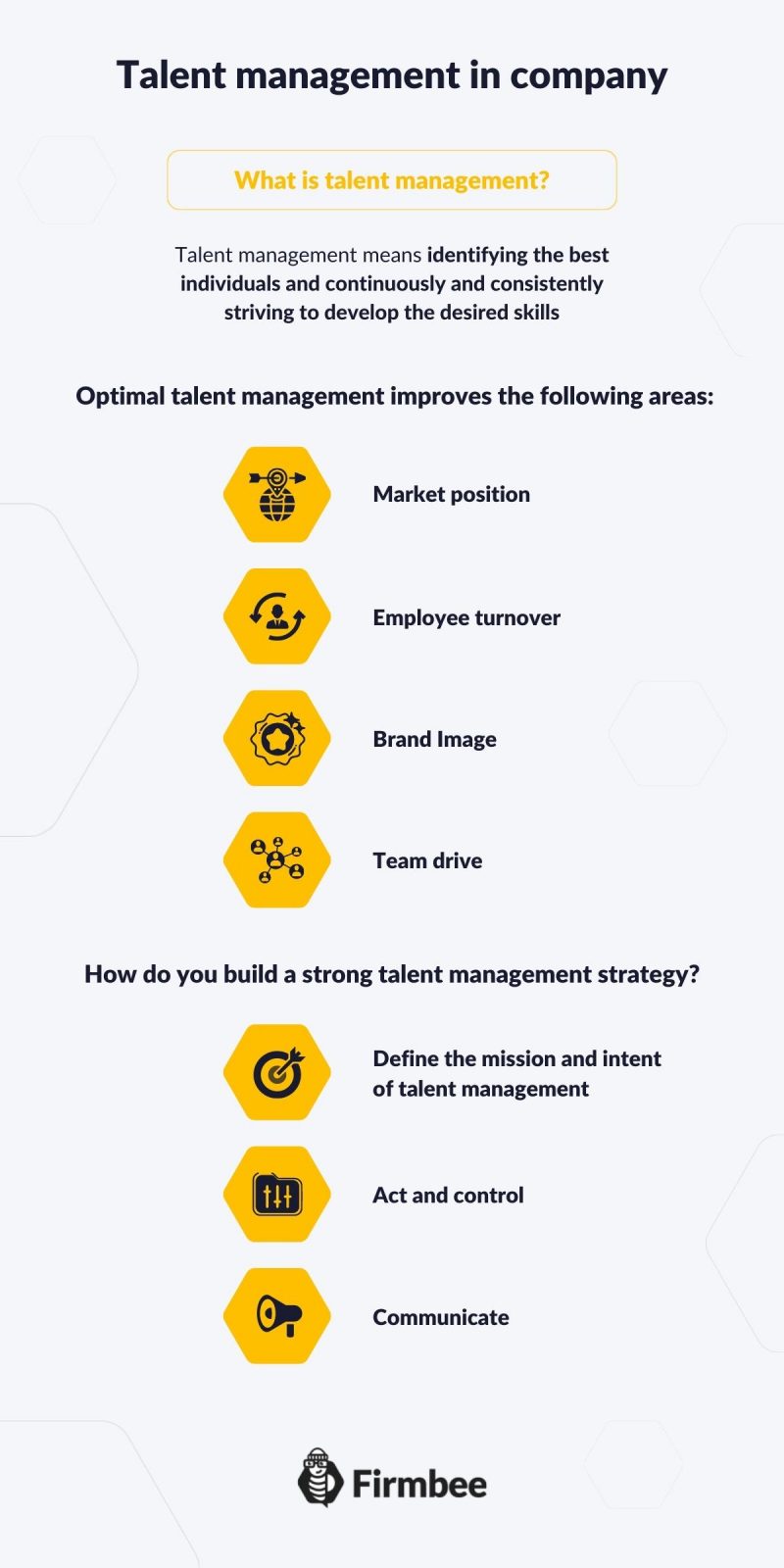Professional companies and modern enterprises know very well that business success largely depends on employee engagement. This is why the right personnel management can give your organization a significant competitive edge. Without further ado, take a look at our comprehensive guide to talent management and get inspired.
Talent management in company – table of contents:
- What is talent management?
- How does talent management affect company performance?
- How do you build a strong talent management strategy?
- Two proven talent management strategies
- Summary
What is talent management?
The definition of the process may raise some questions, but the premise of the strategy is clear. The model used by HR experts focuses on starting with the best candidates.
Establishing relationships is only the beginning. Title management means identifying the best individuals and continuously and consistently striving to develop the desired skills. Proper talent management also requires effective motivation and inspiration so that the employee discovers the full potential of his/her abilities. Such an attitude guarantees desired results for all members of the workplace.

How does talent management affect company performance?
To answer this question, it’s worth citing statistics. According to the Gallup Institute, exceptionally engaged employees perform 21% better than their rivals, and the value is calculated in profitability! Such report results definitely confirm the great importance of this model for the functioning of a company.
However, this is not the end of the perks. Optimal talent management improves the following areas:
- Market position – a comprehensive team of professionals allows for overcoming unexpected difficulties and challenges. Quick adaptation and implementation of the right decisions will turn every danger into an opportunity, and then a platform for generating further profits.
- Employee turnover – the average cost of an employee resigning is 33% of their annual salary. In this context, professional talent management is a very important investment in the future and a huge source of savings. An individual approach, numerous opportunities for career progression and promotion – are the factors that build loyalty and loyalty of a specialist. Such a person perceives the positive aspects of the further partnership, which minimizes the risk of resignation.
- Brand Image – Individuals are responsible for the positive or negative perception of a brand. Direct contact with customers helps to model strong bonds, and this translates into financial results. To achieve the desired effect, the employee must present the highest quality of service. What’s more, professional talent management makes it possible to identify the strengths of a particular person and target that sector. A practical instrument is the Gallup test – a special questionnaire that reveals the strongest traits of the respondent and the results can be an excellent source of knowledge for the HR team.
- Team drive – Gusto released a report in which 33% of people surveyed cited working in a great team as the primary reason for continuing to work with a particular company. A true leader encourages the others in the group, sets the optimal pace of activity, and sets ambitious goals.
How do you build a strong talent management strategy?
To do so, you should determine the three most important issues of the whole procedure, and following the described instructions will ensure the interest of talented candidates. To guarantee the practicality of today’s text, we also include two ready-made models for implementation.
- Define the mission and intent of talent management – this is the piece that enables you to hire the right candidates. Clarifying the requirements leads to better matching of applications received and a larger pool of experts. The information is a facilitator for the candidates themselves, who can familiarize themselves with the future responsibilities.
- Act and control – lack of systematic monitoring of achievements prevents further development and assessment of implemented changes. The supervision system should be adjusted to the specifics of a given enterprise and previously established plans.
- Communicate – Talent management requires partnership with all team members, regardless of position. It is extremely important to talk to the candidate and get regular feedback. Conversations allow you to successively set further goals, but also to embrace the expectations and ambitions of the professional himself.
Two proven talent management strategies
The first tactic involves hiring only the best professionals from the available pool of candidates. By choosing this solution, the company immediately gets employees with the highest level of skills. Candidates do not need a long induction process and a lot of training, and their qualifications allow them to start work immediately. It is worth noting that the best candidate policy strengthens the resources of the entire organization and increases resistance to unprecedented threats.
However, each system has its limitations and restrictions and this choice also means higher initial costs. Finding the right person can be a tedious, complicated and long-term process.
The alternative strategy is to promote individuals who are just showing potential. This type of strategy allows you to find candidates faster, as well as save costs and increase the available workforce. This option builds strong relationships and employee loyalty, which has the effect of stabilizing turnover rates and subsequent economic success for the institution’s budget.
Disadvantages: slower growth rates, lower professional achievement, and likely higher expenses associated with training, implementation courses, and regular education of future experts.
Summary
Corporate talent management is a particularly productive and efficient tool for the HR department. Designing a functional system requires following a few guidelines but the benefits surely outweigh the efforts and bring about growth.
Read also: Talent Management Systems in the organization
If you like our content, join our busy bees community on Facebook, Twitter, LinkedIn, Instagram, YouTube.
Author: Nicole Mankin
HR manager with an excellent ability to build a positive atmosphere and create a valuable environment for employees. She loves to see the potential of talented people and mobilize them to develop.


















